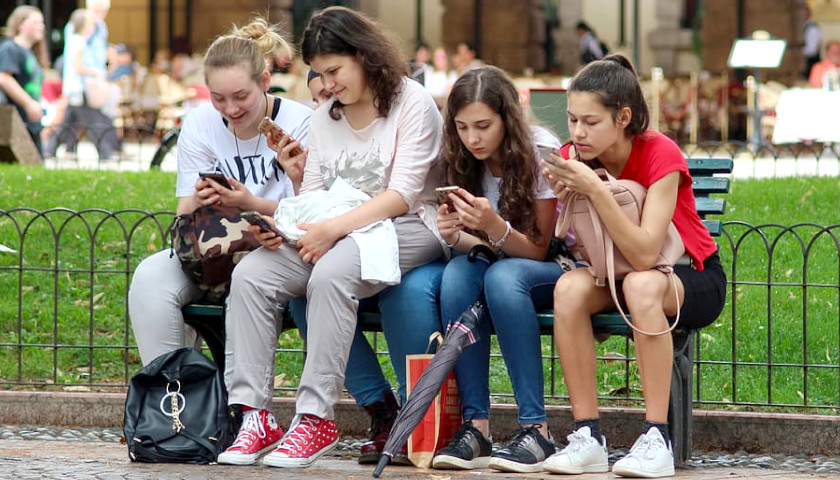by Frank DeVito
Smartphones are the new cigarettes: They should not be in the hands of children.
Conservatives often hesitate to use the force of government to ban something, even if it is clearly harmful. Avoid the nanny state, let the free market handle it, and so on. But what if we have a crisis?
When the message got out that cigarettes were directly linked to serious, deadly diseases, the campaign to stigmatize them (and especially to get them out of the hands of children) received broad support. The change the campaign influenced is staggering: In 1965, an estimated 42.4 percent of American adults smoked; by 2021, that number dropped to 11.5 percent. The avid cigar smokers among us may validly argue that this campaign has actually gone too far in turning the culture against tobacco.
But that is a topic for another day. The point is that when society awakens to a cultural crisis, a mix of public advocacy and legal action can make a huge impact. And although smartphones may be relatively new, mainstream studies are already raising the negative effects smartphones may have on children — everything from behavioral problems and physiological addiction to sleep problems and neurological diseases.
The Harm Smartphones Inflict
One doesn’t need scientific data to realize that smartphones (again, especially in the hands of children) are, at best, a major issue to contend with and, at worst, a looming crisis to confront. This must be put into historical context: Seventy years ago, televisions, ending up in almost all living rooms, changed the social reality of human beings as it had been from the dawn of civilization. Before the screen, leisure and entertainment were at least somewhat active. The living room was a place for smoking and drinking, singing and dancing, talking and laughing. The television ushered in a completely passive form of entertainment: press the button, sit back, no further engagement required.
But the television had limits, with a certain number of channels and certain shows that ended at certain times. The internet has grown the possibility for infinite passive entertainment: There is literally more content available on demand than anyone could consume in a lifetime. And the smartphone took that addictive, infinite screen and put it right into your pocket. We have transformed from a world where, for centuries, we spent our free time engaged in active leisure and human interaction to a world where people can spend entire days, weeks, possibly even lifetimes focused on a flashing screen.
As Elizabeth Self at the Institute for Family Studies wrote recently, smartphones and social media “blur the lines” between virtual and real spaces, between work and play. Kids are being mentally and emotionally destabilized as they live increasingly online lives:
[R]ather than offering the benefits of leisure well spent, social media makes kids less happy. When handed personal devices with social media apps, kids’ outside play decreases, their grades slip, and their mental health plummets.
Self summarizes well the big-picture problem. This crisis is not merely one of a particular looming neurological disease or behavioral problem that requires a societal adjustment. This technology is new, rapidly evolving, and obviously addictive, and it is making people unhappy, unhealthy, and dumb.
Kids scroll rather than run, climb, and play. They DM rather than talk. This crisis is not an ancillary cultural issue; it is transforming humans into quasi-cyborgs who seldom function without the aid of their ever-present supercomputer.
How Do We Solve the Smartphone Crisis?
The first step is to admit that there is a problem. Sane persons must acknowledge that smartphones and social media are not simply the latest technology but instead bring about a fundamental transformation of the human experience. The issue needs to be addressed as such.
If the severity of the problem is accepted, what is the appropriate reaction? Do we accept that this technology is here to stay and seek to adapt to it? Or is something more radical called for? For now, most of us cannot become Luddites, burn the phones, and move on. But we should do more than just accept a smartphone fate.
There should be a policy response. Libertarians will inevitably react negatively to this, stating that the market has produced cellphones and that individuals and markets will eventually use their autonomy to find the proper way to incorporate this new technology into society. But most of us can (and should) put the most extreme libertarian response to the side. There comes a point when society acknowledges that something is bad for (or, at least, extremely dangerous to) the common good and collectively decides that public action is warranted. Children are not permitted to smoke cigarettes, purchase alcohol, or view pornography because these are harmful to the developing person. The same, as has been demonstrated, must be acknowledged for smartphones.
There has been a somewhat mainstream call to at least get smartphones out of schools. This is a modest and reasonable starting point. Children are clearly unable to handle the addictive nature of these technologies while at school, so banning them from schools is a perfectly reasonable way to ensure that our kids, you know, learn things.
But this is just the tip of the iceberg. People are starting to wake up to the scope of the problem. Recently, a group in England began a campaign to ban smartphones for all children under the age of 16 and to add “‘tobacco-style’ health warnings” to phone packaging. Conservatives tend to have a knee-jerk reaction to calls for broad government regulation, but the current crisis may actually be unprecedented in human history. We now have technology that glues its users’ eyes to screens for most of their waking hours, scrolling through feeds at the expense of most or all human interaction. Isn’t it reasonable to at least consider drastic action to discourage such addictive behavior?
A small town in Ireland thinks so. This year, in the town of Greystones, Ireland, parents came together and enacted a voluntary policy where they do not allow their kids to have smartphones until the age of 12 or 13. The goal is to “help prolong childhood by lessening the anxiety and exposure to adult materials that smartphone usage often eggs on.” This laudable effort gets to the heart of the matter. Constant smartphone use increases anxiety, decreases normal human socialization, and exposes children to adult materials. Isn’t it a matter of simple prudence to decide that children — in the formative years when they should be learning to play, form healthy relationships, and simply be human beings — shouldn’t have these reality-altering devices?
Extreme Problems Require Extreme Solutions
At least the conversation has begun. The studies are coming in, activist groups are taking notice, and parents are beginning to sense that there is a major problem. And if we are honest with ourselves, this is a matter of common sense. Even those of us who are functioning adults with healthy marriages, strong friendships, normal human hobbies, and a Christian desire for virtue and self-control struggle greatly to control our smartphone use. Personally, even after removing myself from nearly all social media accounts and deleting the internet browser and email apps from my phone completely, I have a very difficult time putting my phone away and staying present to the people around me. How can we expect growing, impressionable children to control themselves with such addictive devices in their pockets?
We should entertain policy options that may seem extreme — because this problem is extreme. We hold in our pockets supercomputers that seem programmed to take all our time and attention. This threatens to form a people incapable of normal human interaction and to expose them constantly to vulgar, obscene, and completely unnecessary content.
History may show that smartphones were indeed a threat to thriving civilization. Hopefully, policymakers and cultural leaders will help turn the tide and push back against the supposed inevitability of a smartphone for every pocket and a TikTok account for every citizen. In the meantime, delete this toxic stuff from your phone, take steps to control yourself, and don’t let your kid have one while they live in your house.
This may seem extreme, but human civilization as we know it may actually hinge on this issue. Be extreme. Ditch the phone addiction.
– – –
Frank DeVito is an attorney currently serving as counsel at the Napa Legal Institute. His work has previously been published in several publications, including the American Conservative, the Federalist, Front Porch Republic, and Public Discourse. He lives in eastern Pennsylvania with his wife and children. The views expressed in this article are those of the author and not necessarily of his employer.








